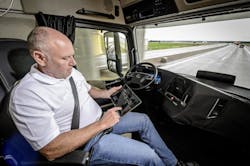It’s a question being asked with more and more frequency today not only within the freight industry but the business world at large: Are robots going to help us do our jobs better? Or replace human workers altogether?
The question is particularly poignant in trucking as the push to create self-driving vehicles continues to pick up speed.
Kathy Winter, vice president and general manager of the automated driving solutions division at Intel Corp., recently described (pretty aptly to my mind at least) why the pace is accelerating where the development of driverless vehicles is concerned.
“This past Christmas, my brother Jim passed away following injuries sustained during an automobile accident,” Winter noted.
“Jim was one of the more than 40,000 people who died in traffic accidents on U.S. roads last year; 93% of them caused by human error,” she stressed. “By taking humans out of the driver’s seat – and all of the distractions and errors they bring with them – self-driving cars offer real life-saving potential. The faster we can get those cars on the roads, the more lives we can save.”
[Winter is also no stranger to this space, as you can note past commentary she’s made on the subject of self-driving technology here and here.]
Beyond their life-saving potential, though, she also expects driverless vehicles to deliver many other societal benefits.
“Consider: Self-driving vehicles are expected to free more than 250 million hours of individuals’ commuting time per year in the most congested cities in the world,” Winter said. “And we expect public safety costs related to traffic accidents to drop significantly – some $234 billion from 2035 to 2045.”
There are also big rewards for the makers of autonomous vehicle technology in the winds, too, should they start hitting out roads in significant numbers.
Indeed, Ireland-based consulting firm Research and Markets noted in its recent report Autonomous Vehicle Market: Global Drivers, Restraints, Opportunities, Trends, and Forecasts to 2023 that the compound average growth rate (CAGR) for the global autonomous vehicle market’s revenue is expected to reach 39.6% between 2017 and 2027 – with the overall market worth some $126.8 billion a decade from now.That’s all well and good, of course, except that other reports – like this one – project the potential for huge job losses specifically amongst truck drivers should the adoption rate of driverless technology occur at the rate all the experts are predicting.
[To be fair, however, there’s a lot of doubt about that since many folks remain leery of self-driving vehicles – especially where heavy trucks are concerned.]
But what do everyday folks think of those trends? Not just in terms of driverless vehicles but of the overall view toward “robotizing” large swaths of the global economy?
Well, according to a recent independent global survey of nearly 4,000 consumers conducted by computer chip maker ARM and Northstar Research Partners, those who believe the widespread adoption of “artificial intelligence” or AI will lead to “rampaging job-taking robot chaos” are actually in the minority.
According to this poll, at least, when considering a future where AI is increasingly part of their lives, 30% of consumers identified “fewer or different jobs for humans” as the biggest drawback. However, respondents remained positive that robots would enhance rather than replace humans in most jobs, and assist by increasingly performing more tedious and dangerous jobs.
“It is encouraging to see the survey results highlighting the optimism and opportunities tied to AI, but we are just scratching the surface of its potential,” noted Joyce Kim, vice president of global marketing at ARM, in a statement.“The impact of AI on jobs will be disruptive but it can be a manageable and highly positive disruption in terms of opportunities and enhancing our lives,” Kim added. “If we increase our investments in STEM [science, technology, engineering, and math] and educating the next-generation workforce on AI technologies, we can ensure they are not left behind in the robot economy.”
Overall, consumers were “surprisingly optimistic” on the future outlook, in ARM’s view, as with 61% believed that “society would become better” with increased automation and AI.
In particular they support applications in health care and science, and are prepared to trust machines to diagnose illness, drive vehicles, and be personal companions.
Yet it’s not all peaches and cream, as those polled identified both benefits and drawbacks to the growing use of robots across many different aspects of their lives.
What are some of the biggest benefits of a future in which AI significantly impacts life?
- Some 37% believe there will be advancements that help humans, i.e., in medicine and science.
- About 29% believe more tedious or dangerous tasks will be done by robots.
- Another 19% believe in lower business cost leading to better service and lower prices.
- Some 11% see less chance of human accidents/mistakes.
- About 5% more free time
What is the biggest drawback of a future in which AI significantly impacts life?
- About 30% think there will be fewer or different jobs for humans as a result of more “robotization.” Those polled cited construction, delivery, and transportation as the industries being most impacted from wider use of robotic systems.
- Some 20% don’t like the thought of giving some control over their lives to machines. Yet 55% would trust an autonomous car if its safety record is proven to be better than human-driven vehicles, with 70% expecting to trust self-driving vehicles in a decade.
- But 18% fear more data being shared and potentially stolen online due to wider use of AI.
- Another 12% think more societal issues will develop around fewer opportunities for humans as they feel less useful and/or get too much free time.
- Some 11% worry that machines could become independent and able to think for themselves (shades of The Terminator anyone?)
- About 9% are concerned there will be more of a tendency to build relationships with machines more than humans.
Those are just a few things to keep in mind as we move forward into a potentially more automated era of trucks, cars, and just about everything else, too.


